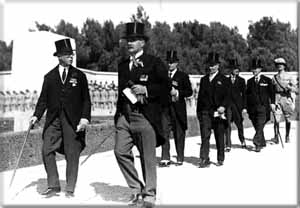November 2nd, 1917 The Balfour Declaration
 The fact that the Balfour Declaration was issued in 1917, in order to enlist Jewish support for the allies and the fact that this support was forthcoming are not sufficiently appreciated in Palestine. The Arabs do not appear to realize in the first place that the present position of the Arab world as a whole is mainly due to the great sacrifices made by the Allied and Associated Powers in the War and, secondly that, in so far as the Balfour Declaration helped to bring about, the Allies had won the War, it is improbable that all the Arab countries, except Palestine, would now have become or be about to become independent States.
The fact that the Balfour Declaration was issued in 1917, in order to enlist Jewish support for the allies and the fact that this support was forthcoming are not sufficiently appreciated in Palestine. The Arabs do not appear to realize in the first place that the present position of the Arab world as a whole is mainly due to the great sacrifices made by the Allied and Associated Powers in the War and, secondly that, in so far as the Balfour Declaration helped to bring about, the Allies had won the War, it is improbable that all the Arab countries, except Palestine, would now have become or be about to become independent States.
“It is none the less a historical fact that in drawing up the Balfour Declaration, Mr. Balfour did have a future Jewish State in Palestine definitely in mind. That fact is well known to those who were in touch with Mr. Balfour at the time. It was also made public by Mr. Lloyd George himself, who was Prime Minister at the time and who, in the evidence he gave before the Palestine Royal Commission, spoke as follows: “The idea was, and this was the interpretation put upon it at the time, that a Jewish State was not to be set up immediately by the Peace Treaty without reference to the wishes of the majority of the inhabitants. On the other hand, it was contemplated that when the time arrived for according representative institutions to afforded them by the idea of a national home and had become a definite majority of the inhabitants, then Palestine would thus become a Jewish Commonwealth.”
Source: Report of the Palestine Royal (Peel) Commission, Cmd. 5479, 1937, Chapter II, paragraph 20, quoted from Report of a Committee set up to consider Certain Correspondence Between Sir Henry Mc Mahon [HIS MAJESTY’S HIGH COMMISSIONER IN EGYPT] and The Sharif of Mecca in 1915 and 1916 March 16, 1939 Cmd. 5974)** (have in PDF)
David Lloyd George, Prime Minister at the turn of the time of the Balfour Declaration, testified before the Royal (Peel) Commission of 1937
“There could be no doubt as to what the Cabinet then had in their minds. It was not their idea that a Jewish State should be set up immediately by the Peace Treaty without reference to the wishes of the majority of the inhabitants. On the other hand, it was contemplated that when the time arrived for according representative institutions to Palestine, if the Jews had meanwhile responded to the opportunity afforded them by the idea of a National Home and had become a definite majority of the inhabitants, then Palestine would thus become a Jewish Commonwealth. The notion that Jewish immigration would have to be artificially restricted in order to ensure that the Jews should be a permanent minority never entered into the heads of anyone engaged in framing the policy. That would have been regarded as unjust and as a fraud on the people to whom we were appealing.”
Source: Royal (Pee)Commission of 1937 (Insert better source/Page)
David Lloyd George, Prime Minister of Great Britain at the States of Israel at the time of the Balfour Declaration, testified before the Royal (Peel) Commission of 1937
Through Sir Mark Sykes and Colonel Lawrence w)e informed the Arab leaders, King Hussein and his son, Faisal, of our proposals (regarding the Balfour Declaration). We could not get in touch with the Palestine Arabs as they were fighting against us.
The Arab leaders did not offer any objections to the Declaration so long as the rights of the Arabs of Palestine were respected. Pledges were given to the non-Jewish population of Palestine who constituted the great majority of its inhabitants, as well as to the Jews. These were the results of conversations which we had with such Arab leaders as we could get in touch with. There was a two-fold understanding given to them, that the establishment of a Jewish National Home would not in any way, firstly, affect the civil or religious rights of the general population of Palestine; secondly, would not diminish the general prosperity of that population. Those were the only pledges we gave to the Arabs.
Source: Prime Minister David Lloyd George in his book, The Truth about the Peace Treaties, published in 1938.
November 2, 1917 The Balfour Declaration Transjordan
Mr. Leopold S. Amery, one of the Secretaries to the British War Cabinet in 1917 and 1918, and thereafter Under Secretary and Secretary of State for the Colonies, gave the following testimony upon this subject to the Anglo-American Committee of Inquiry in January, 1946.
“Q. (by Mr. Buxton) The Trans-Jordan was definitely in the minds of the framers of the Balfour Declaration when the Declaration was issued? There is no question of that. Palestine embraced Trans-Jordan in the concept of the persons who framed the Balfour Declaration?
“A. Yes. To the best of my recollection, certainly at the time the Cabinet decided on the Balfour Declaration they regarded TransJordan as being within Palestine. They also, I think, regarded it, as probably the whole thing was experimental, that there would be eventually a Jewish majority over the whole of Palestine.
Source: Anglo-American Committee of Inquiry, Jan 30, 1946 (p112)



